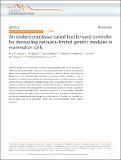An endoribonuclease-based feedforward controller for decoupling resource-limited genetic modules in mammalian cells
Author(s)
Jones, Ross D; Qian, Yili; Siciliano, Velia; DiAndreth, Breanna; Huh, Jin; Weiss, Ron; Del Vecchio, Domitilla; ... Show more Show less
DownloadPublished version (1.714Mb)
Publisher with Creative Commons License
Publisher with Creative Commons License
Creative Commons Attribution
Terms of use
Metadata
Show full item recordAbstract
© 2020, The Author(s). Synthetic biology has the potential to bring forth advanced genetic devices for applications in healthcare and biotechnology. However, accurately predicting the behavior of engineered genetic devices remains difficult due to lack of modularity, wherein a device’s output does not depend only on its intended inputs but also on its context. One contributor to lack of modularity is loading of transcriptional and translational resources, which can induce coupling among otherwise independently-regulated genes. Here, we quantify the effects of resource loading in engineered mammalian genetic systems and develop an endoribonuclease-based feedforward controller that can adapt the expression level of a gene of interest to significant resource loading in mammalian cells. Near-perfect adaptation to resource loads is facilitated by high production and catalytic rates of the endoribonuclease. Our design is portable across cell lines and enables predictable tuning of controller function. Ultimately, our controller is a general-purpose device for predictable, robust, and context-independent control of gene expression.
Date issued
2020Department
Massachusetts Institute of Technology. Department of Biological Engineering; Massachusetts Institute of Technology. Synthetic Biology Center; Massachusetts Institute of Technology. Department of Mechanical Engineering; Massachusetts Institute of Technology. Department of Electrical Engineering and Computer ScienceJournal
Nature Communications
Publisher
Springer Science and Business Media LLC